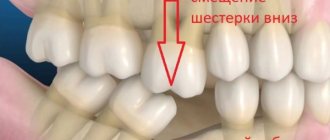The appearance of an unpleasant odor from the mouth, medically called “halitosis,” is a signal of trouble in the growing organism. Kaliningrad residents can notice this symptom when communicating with a child, laughing or kissing.
In most cases, odor occurs due to poor hygiene, which disrupts the balance of microflora in the mouth and increases the number of pathogenic microorganisms. During the decomposition of bacteria, compounds of hydrogen sulfide and nitrogen are formed, which are exhaled along with the air.
In this situation, the problem can be solved with the help of hygiene and does not pose any danger to the child’s health. However, there may be other reasons for the appearance of a specific odor from the mouth. In what cases should parents be wary - we will find out further...
Risk factors affecting fresh breath
Let's start by identifying the reasons that negatively affect healthy breathing. At the same time, we note that microflora imbalance can occur even in healthy children. This happens for a number of reasons:
- failure to comply with hygiene rules, as we have already outlined;
- dry mouth due to insufficient saliva;
- insufficient water and fluid intake;
- breathing through the mouth, out of habit or due to nasal congestion;
- oral infections (untreated caries, gum disease, etc.);
- consumption of foods with a pungent odor (garlic, onions) or those that provoke fermentation (legumes, grapes);
- taking medications;
- hormonal imbalance;
- smoking (relevant for teenagers).
Thus, in most cases, the cause of bad breath is problems in the oral cavity, infections and poor diet.
Other reasons
With an incorrectly composed diet, similar problems are also observed. When consuming large amounts of carbohydrate foods, fried, fatty, and salty foods, the function of the esophagus can be disrupted, and the immune system also suffers. In this case, during the illness you will need to follow a diet - meals should be limited to small portions, but should be frequent. With frequent split meals, food has time to be absorbed, which significantly facilitates the functioning of the digestive system.
Some types of stomatitis are also accompanied by the appearance of the smell of spoiled fish. Most often, this symptom is felt after waking up. This is due to the fact that during sleep the baby’s digestive system digests food and its breakdown products. The liver is not able to cope with a heavy load, cleansing the body, which is why a fishy aroma appears. It is often accompanied by a yellow coating on the surface of the tongue.
If dental diseases develop in the mouth - caries, gingivitis, periodontitis, this is also accompanied by halitosis. In this case, you need to clean your tongue and undergo dental treatment, which is carried out by a dentist. This way you can quickly get rid of an unpleasant symptom.
In girls during puberty, this phenomenon is often triggered by hormonal changes in the body (the smell becomes more intense during menstrual periods). The main diseases that cause the problem: pathologies of the biliary system or liver, increased blood glucose levels, tumor processes in the body.
How to distinguish a normal smell from a problematic one?
If an unpleasant symptom occurs exclusively in the morning and goes away after brushing your teeth, then we are talking about a physiological norm. If bad breath is observed after hygiene procedures and becomes protracted, then this deviation requires the closest attention from parents.
In addition, it is worth noting that the above risk factors can be eliminated. However, if hygiene is maintained, respiratory infections and specific foods are excluded, and the unpleasant symptom persists for a long time, this is a good reason to consult a doctor.
In this case, altered breathing can signal very specific diseases. Let's look at which ones further...
List of diseases that can be detected
Despite the fact that halitosis is not a disease, it is an important diagnostic symptom by which a specialist can assume the presence of a certain disease in the body. Suspected health problems may include:
- diseases of the nose and nasopharynx: sinusitis, pharyngitis, tonsillitis, adenoiditis;
- food allergies or respiratory rhinitis causing nasal congestion;
- dental diseases of teeth and gums;
- Gastrointestinal diseases: gastritis, increased stomach acidity, intestinal dysbiosis, etc.;
- endocrine disorders: diabetes, thyrotoxicosis, etc.
As can be seen from this impressive list of diseases, solving breathing problems can fall within the competence of a variety of highly specialized specialists: otolaryngologist, dentist, gastroenterologist, endocrinologist.
Prevention
Prevention and treatment of dental diseases in children should be carried out every six months. Children should be seen by a pediatric dentist. It is necessary to treat the underlying disease, then the stench will disappear. If it is caries, it is necessary to carry out sanitation, get rid of stones and install fillings. An illness in an infant requires proper feeding of foods that are well absorbed by the newborn’s body. If you have abdominal pain, you should not delay a visit to the pediatrician to avoid complications. It is important to constantly adhere to these rules:
- Systematic daily thorough oral hygiene.
- If the chewing organs have just erupted, it is worth using a finger brush.
- Parents should supervise the process of cleansing the tongue, incisors, canines, molars, cheeks, and palate.
- For cleansing, dentists recommend using sterile gauze wipes, which the mother should soak in boiled water.
- Older children should use mouth rinses and dental floss.
It is important that children do not eat a lot of sweets. The child's drinking regime should be sufficient. It is not recommended to give your little one soda or store-bought juices. It’s better to cook compote for your child and squeeze the juice out of the fruit. Avoid family scandals and conflicts. After all, constant stress and negativity weakens the baby’s delicate nervous system. Only love and care create excellent preconditions for good health.
What can a smell “tell”?
As we mentioned earlier, unhealthy breath can quite eloquently indicate a certain nature of the disease. For example:
- a sour smell indicates problems with the stomach: high acidity, reflux or dysbacteriosis;
- the smell of a rotten egg - about a stomach ulcer or a violation of bile outflow;
- putrefactive – about diseases of the esophagus and low acidity of the stomach;
- acetone – about problems with blood sugar levels (diabetes) or dehydration;
- ammonia - about kidney disease, liver dysfunction and diffuse toxic goiter;
- boiled cabbage - problems with metabolism, liver and kidney diseases.
As a rule, already at the stage of collecting anamnesis and during the clinical examination, the doctor can make an assumption about the true causes of the problem.
Taking medications
In some cases, an unpleasant fishy odor appears from the mouth as a consequence of taking certain medications. Especially if the treatment was long-term. If such drugs are prescribed for the treatment of pathologies of internal organs, the state of the microflora should be monitored in parallel and probiotics should be taken to prevent an imbalance in the microflora of the intestinal tract.
With prolonged use of potent drugs, not only the microflora is disrupted, but also metabolic disorders occur within the baby’s body. If the function of at least one organ of the digestive system is impaired, the food in the stomach can rot and decompose, which causes the appearance of odor. Drugs that can cause fish-like halitosis include:
- antihistamines (prescribed by a doctor in the presence of an allergic reaction, parasitic diseases or inflammatory processes);
- some antibacterial drugs;
- antidepressants or psychosomatic drugs;
- medications to treat asthma;
- vasodilators for the treatment of a runny nose or medications for chronic tonsillitis.
This is why it is very important not to self-medicate, but to follow your doctor’s recommendations. After all, only a qualified specialist can draw up a competent treatment regimen, taking into account all the risks and contraindications for the child. For example, if antibacterial drugs are prescribed, it is necessary to take probiotics in parallel in order to prevent an imbalance of the intestinal microflora.
Diagnosis and treatment
To diagnose ENT diseases, an otolaryngologist uses hardware and laboratory tests. These include:
- rhinoscopy – to examine the nasal cavity;
- radiography and computed tomography - to assess the condition of the sinuses;
- examination of nasal secretions to determine the causative agent of inflammation;
- Blood and urine tests will complement the clinical picture.
In the process of collecting anamnesis, the doctor is interested in the following questions:
- How long has the child been complaining of discomfort?
- What time of day does the smell appear and how long does it last?
- What foods did the child eat?
- how much water does he drink?
- Does the smell go away after brushing your teeth?
- What chronic diseases does he have?
- what medications does he take?
Treatment does not imply the elimination of the symptom itself, as such, but the therapy of the specific disease that provoked its appearance. If, as a result of examination and diagnostic measures, pathologies of the nose or nasopharynx were identified, the doctor will prescribe adequate drug treatment, which may include:
- antibacterial therapy (taking antibiotics);
- vasoconstrictors and antihistamines;
- special medical procedures;
- physiotherapy: inhalations, UV and UHF therapy;
If necessary, the otolaryngologist can refer a small patient to specialized specialists if the solution to this problem falls within their competence (dentist, gastroenterologist, etc.).
Psychosomatics as one of the reasons
Such symptoms may be caused by psychosomatic factors. In this case, these are not signs of the disease. There is such a thing as false halitosis. This disease, which relates to mental disorders, is more often diagnosed in adults. Moms and dads who worry excessively about their child's health may not notice how this intense anxiety transforms into real mania. Adults think that the child smells unpleasant. In an effort to help the baby, they take many activities.
So a non-existent disease becomes a problem, and the child is constantly in a state of stress. In this case, halitosis is only a cause for concern for parents, and not a true symptom of possible pathologies. Parents should listen to the doctor’s recommendations and follow all instructions. Typically, treatment of halitosis in this case is carried out by a neurologist or psychiatrist, working in parallel with both the child and his parents.
Preventive recommendations
In conclusion of our review, I would like to draw the attention of parents to adjusting their children's diet. Our nutritional recommendations are as follows:
- Let us remember that “bad” bacteria love a sweet environment, so it makes sense to limit the consumption of industrially produced sweets and sugar.
- As a dessert, you can offer your child natural sweets made from dried fruits and nuts, as well as fresh fruit.
- Replace carbonated drinks with pure water or herbal tea made from chamomile and mint.
- To create beneficial microflora in the intestines, a child should consume more “live” fermented milk products: cottage cheese, kefir, yoghurts.
Parents need to understand that this delicate problem requires a qualified approach, since over time it can lead not only to problems at the physiological level, but also cause social isolation of the child.
Kaliningrad residents can make an appointment with a pediatric otolaryngologist by filling out an online form on our website or by calling: +7 (4012) 357-773 or +7 (4012) 973-100.











